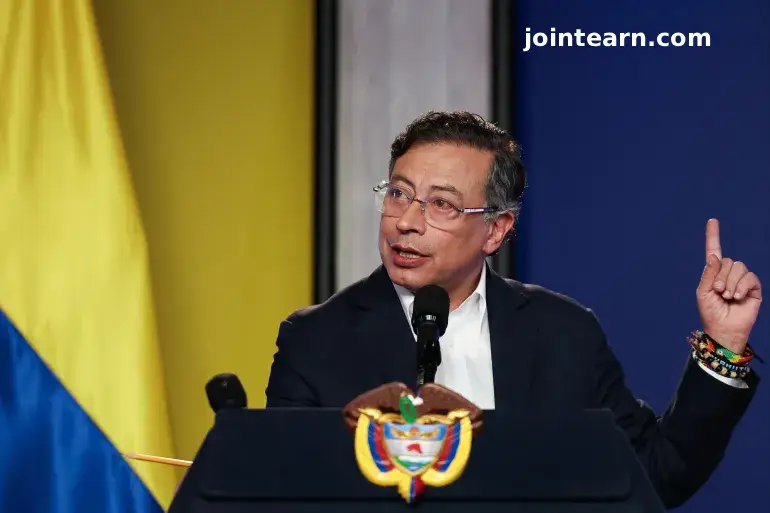
In a dramatic escalation of tensions between Washington and Bogotá, the United States Department of the Treasury on Friday announced sweeping sanctions against Colombian President Gustavo Petro, his family, and Interior Minister Armando Benedetti.
The move marks one of the most severe diplomatic rifts in decades between the two nations and highlights the Trump administration’s increasingly aggressive stance toward left-leaning governments in Latin America.
Treasury Accuses Petro of Enabling Drug Cartels
In its statement, the U.S. Treasury Department accused Petro of failing to curb Colombia’s cocaine trade and of “shielding criminal networks” under the guise of his ‘Total Peace’ initiative—a domestic policy aimed at ending decades of armed conflict through negotiations with rebel and criminal groups.
“Since President Gustavo Petro came to power, cocaine production in Colombia has exploded to the highest levels in decades,” said Treasury Secretary Scott Bessent. “President Petro has allowed drug cartels to flourish and refused to take decisive action.”
The sanctions freeze any U.S.-based assets belonging to Petro, his relatives, or Interior Minister Benedetti and prohibit American citizens or businesses from engaging in transactions with them.
Petro Fires Back: “Not One Step Back and Never on My Knees”
President Gustavo Petro, Colombia’s first left-wing leader in modern history, condemned the sanctions as politically motivated. Writing on X (formerly Twitter), Petro said the move fulfilled threats from U.S. Republican leaders and represented “an act of interference” in Colombia’s sovereignty.
“My wife, my children, and I have been placed on the OFAC list,” Petro wrote. “Not one step back and never on my knees.”
He vowed to challenge the sanctions in U.S. courts and reaffirmed Colombia’s longstanding commitment to combating narcotics trafficking.
A History of Tense Relations Between Trump and Petro
The feud between President Donald Trump and President Gustavo Petro has simmered since Trump returned to the White House for a second term in January 2025. Their first clash came just days into Trump’s new presidency, when he launched a mass deportation campaign targeting undocumented immigrants.
Images of shackled migrants boarding U.S. military aircraft drew global outrage. Petro refused to accept two deportation flights en route to Bogotá, writing, “The U.S. cannot treat Colombian migrants as criminals.” Trump retaliated by threatening 30% tariffs on Colombian exports—forcing Petro to relent.
The relationship further deteriorated over disagreements on drug policy, human rights, and U.S. military interventions in Latin America. Colombia remains the world’s largest producer of coca, the raw ingredient in cocaine, and in 2024 saw a 53% increase in cocaine production, according to U.N. data.
U.S. Military Strikes Spark Fury in Bogotá
Since September 2025, Trump has authorized a wave of missile strikes on vessels in the Caribbean and Pacific Oceans, claiming they were involved in drug trafficking. Colombian officials and human rights groups say many of the victims were innocent fishermen.
Among them was Alejandro Carranza, a Colombian fisherman killed when U.S. forces struck what they alleged was a smuggling boat. At least 34 people have been killed in such operations, Petro’s office said.
“These are not war casualties,” Petro wrote shortly before the sanctions announcement. “They are murders.”
At the United Nations General Assembly, Petro condemned the U.S. for what he called “extrajudicial killings,” saying:
“Was it really necessary to shoot missiles at unarmed young men in the Caribbean? The violent war on drugs was a failure — and I replaced it with an effective anti-trafficking policy.”
Diplomatic Breakdown: Aid Cuts and Visa Revocation
The Trump administration’s punitive actions against Colombia extend beyond sanctions. In recent weeks, Washington:
- Revoked Petro’s U.S. visa, citing “reckless and incendiary actions.”
- Decertified Colombia as a U.S. partner in the war on drugs.
- Announced the suspension of all U.S. aid, worth $743 million in 2023 alone.
Trump has openly derided Petro as a “drug dealer” and “thug,” warning that the U.S. could take “serious action” if Colombia does not reduce cocaine exports.
“Petro, a low-rated and very unpopular leader, had better shut down these killing fields immediately—or the U.S. will do it for him,” Trump wrote on Truth Social.
Petro has threatened to sue Trump for slander, calling his remarks “a direct attack on the Colombian people.”
Colombia Recalls Ambassador from Washington
In a symbolic rebuke, Bogotá recalled its ambassador from the United States earlier this week, further straining a bilateral relationship that had long been one of the strongest in the Western Hemisphere.
Historically, Colombia has been a cornerstone of U.S. policy in Latin America, receiving billions in military and anti-narcotics funding through Plan Colombia since the early 2000s.
Political analysts warn that this diplomatic rift could destabilize cooperation on counter-narcotics, migration, and regional security — while pushing Colombia closer to alliances with nations like Brazil, Mexico, and even China.
Benedetti Defiant: “Gringos, Go Home”
Interior Minister Armando Benedetti, who was also sanctioned, dismissed the measures as “imperial overreach.”
“For the U.S., a nonviolent statement is treated the same as drug trafficking,” he posted online. “Gringos, go home.”
Despite the sanctions, both Petro and Benedetti have pledged to continue their government’s peace negotiations and resist what they describe as U.S. efforts to “reassert dominance over Latin America through coercion and threats.”
Conclusion
The Trump administration’s decision to sanction Colombia’s sitting president represents a historic low in U.S.-Colombia relations and signals a broader trend of Washington’s assertive unilateralism across the Americas.
With military strikes, deportations, and aid suspensions all part of the growing confrontation, analysts warn that diplomatic fallout could extend far beyond Bogotá, reshaping alliances and deepening anti-U.S. sentiment across the region.


Leave a Reply